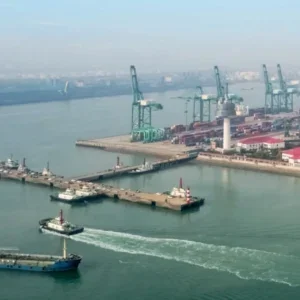For the first time, the show is taking place in Aberdeen. The city, along with its Norwegian counterpart Stavanger, is the joint capital of the North Sea offshore industry. By choosing to hold LiftEx there, LEEA highlights one of the key sources of demand for the most sophisticated and safety-critical lifting equipment.
It also highlights weaknesses in the UK and Scottish economy. Historically, while Norway used its share of North Sea revenues to build one of the world’s biggest sovereign wealth funds, revenues on this side of the North Sea were largely squandered on tax cuts and routine public spending that contributed little to the UK’s long-term prospects.
Over the last year, Scotland’s revenues from North Sea oil dropped precipitiously, falling 97% to £60m, from £1.8bn in 2015. This is partly because of the age of the oilfield, where dwindling supplies make extraction more expensive, but also because of the ongoing low oil price.
For the lifting industry, the impact of this is mixed. On one hand, there is no scope for sales of equipment to new rigs. On the other, aging installations will require maintenance and decommissioning, which will provide opportunities for both equipment sales and service contracts.
While oil revenues decline, the North Sea energy sector continues to offer new opportunities. The UK is well-positioned to benefit from offshore wind. There have already been major projects in England and Wales. In Scotland, most wind turbines have been built onshore, but new offshore projects are underway.
There has also been considerable investment in dockside facilities to support offshore renewables construction, including some in Aberdeen.
While decommissioning of rigs and construction of renewables may provide some hope, overall prospects are as dreich as a rainy November afternoon in Aberdeen.
Globally, we’re on course for a decade of recession and slow growth. The IMF’s most recent World Economic Outlook estimates global growth in the first half of 2016 of 2.9%, down slightly from the same period a year ago. In the UK, the fund forecasts growth to slow from 2.2% in 2015, to 1.8% in 2016 and 1.1% the year after.
Despite much mithering from Remainers, the UK voted for Brexit, and will leave the EU. That might decouple us from a crumbling Eurozone; but, despite the UK government’s ‘No spoilers’ approach to reporting negotiations, it’s clear the country will be locked out of European trade. Where concessions are made, the Conservative track record suggests they’ll benefit London bankers, not Scottish merchants and industrialists. For a country that already feels robbed of its oil wealth, that may be the last straw. The next time LiftEx is in Scotland, English visitors may need to bring their passports.






